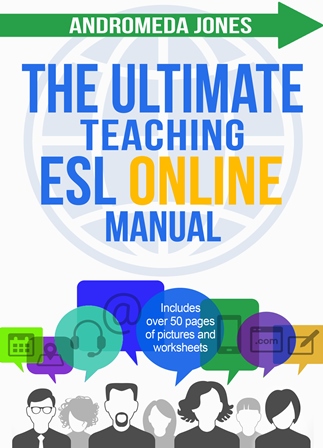An advanced-level TEFL lesson plan for a class of 6-10 students. Grammar exercise from The Ultimate ESL Teaching Manual. Vocabulary exercise from The Ultimate ESL Vocabulary Manual.
Class duration: 90 minutes
Learning objectives: Grammar: reported speech; vocabulary: gestures
Example TEFL Lesson Plan: reported speech
| 10.00 | Warmer: Write on the board the question: “What is the biggest problem in your city? What would you do about it, if you were mayor? and as students join the class ask them to discuss it pairs. |
| 10.10 | Grammar reported speech: Write: ‘I like ice cream on the board.’ Explain that this is direct speech. Ask how you would report that information to someone else. Elicit ‘she/he said that he liked ice cream,’ taking the verbal tense back one step. Draw a grammar table headed ‘Direct’ and ‘Reported.’ In the first line write ‘Present’ in the ‘Direct’ column and ‘Past’ in the ‘Reported.’ |
| 10.20 | Reported speech drill (see below). Fill out the table as you go through the tenses. |
| 10.35 | Reported speech questions. Write ‘Do you like ice cream’ on the board. Elicit the reported question: ‘she / he asked if I liked ice cream.’ |
| 10.40 | Reported speech question drill (see below) |
| 10.45 | Speaking practice: Students speak in pairs about a TED Talk they have listened to for homework. Small discussion at end. |
| 11.10 | Vocabulary: Gestures: The teacher does the gesture and the students must guess the word for it. Introduce: to high-five, to shake hands, to wave, to clap, to give a thumbs up, to blink, to wink, to roll your eyes, to yawn, to shake your head, to nod, to frown. As a new word is discovered, ask students to make example sentences. |
| 11.20 | Finisher activity: Second conditional chain story. Start a sentence with a second conditional and ask student 1 to complete it. Student 2 then uses the end of that sentence to continue the story and so on. For example: Teacher: “If I lived in Norway, I would go skiing every winter.” Student 1: “If I went skiing every winter, I would become good at it.” Student 2: “If I became good at skiing, I would enter the Olympics.” Challenge the class to make the chain as long as possible |
HOW TO TEACH REPORTED SPEECH, DRILL INSTRUCTIONS
The teacher says sentences with different tenses and asks students to recount them. For example:
Tutor: ‘I went to the movies yesterday.’
Student: ‘He said that he had gone to the movies yesterday.’
Tutor: ‘Last week I was jogging when I saw a robbery.’
Student: ‘He said that last week he had been jogging when he had seen a robbery.’
HOW TO TEACH REPORTED SPEECH QUESTIONS
Do/Does: For questions with ‘do’, take away the auxiliary and change it to the reported speech tense. For example:
‘Where does Peter live?’ changes to ‘She asked did where Peter lived. ‘What did you do yesterday?’ becomes ‘He asked what we had done the previous day.’
To be/Can: With ‘to be’ and ‘can’, change the subject and verb back to affirmative order and convert it to reported speech tense. For example:
‘What is your name?’ becomes ‘He asked me what my name was.’
‘When can we have dinner?’ becomes ‘He asked when they could have dinner.’
Yes or no questions: Take away the auxiliary and add ‘if’. For example:
‘Do you speak English?’ becomes ‘She asked me if I spoke English.’
REPORTED SPEECH QUESTION DRILL
Just like the sentences, ask your students questions and get them to recount them in reported speech. For example:
Teacher: ‘Tom, how old are you?’
Student: ‘The teacher asked me how old I was.’
Teacher: Where is the car?
Student: The teacher asked where the car was.
REPORTED SPEECH TABLE
Present simple changes to past simple: ‘I like swimming’ – ‘She told me that she liked swimming.’
Present continuous changes to past continuous: ‘I am watching a movie – ‘She told me she was watching a movie.’
Present perfect changes to past perfect: ‘I have done my homework’ – ‘He told us he had done his homework.’
Present perfect continuous changes to past perfect continuous: ‘We have been skiing for 12 years’ – ‘They said they had been skiing for 12 years.’
Past simple changes to past perfect: ‘We bought a house – ‘They said they had bought a house.’
Past continuous changes to past perfect continuous: ‘I wasn’t feeling well’ – ‘He said he hadn’t been feeling well.’
Past perfect remains past perfect: ‘We had booked the hotel before we left – ‘They said they had booked the hotel before they left.’
Will changes to would: ‘I will go running tomorrow’ – ‘She said that she would go running the next day.’
Present perfect future changes to would + present perfect: ‘By tomorrow I will have completed the project’ – ‘He told us that by tomorrow he would have completed the project.’
May changes to might: ‘I may take up tennis next year’ – ‘She said that she might take up tennis following year.’
Imperative changes to infinitive: ‘Close the door– ‘She told me to close the door.’
TIME MARKERS
‘Today’ changes to ‘that day.’
‘This morning/this afternoon’ changes to ‘that morning/that afternoon.’
‘Tomorrow’ changes to ‘the following day.’
‘Yesterday’ changes to ‘the previous day.’
‘Now’ changes to ‘then.





